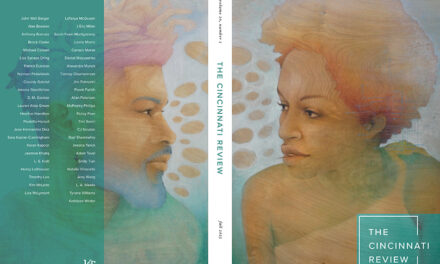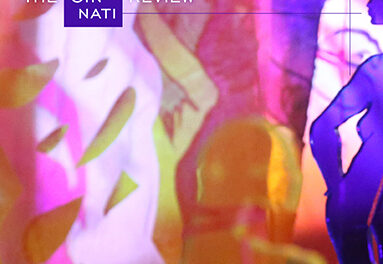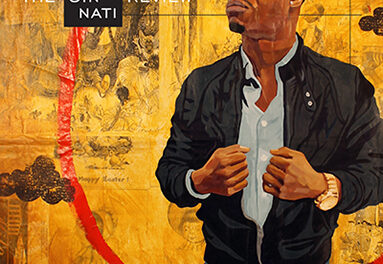Rita came home from the war. The town was not as if she had never left. Some things had changed. The Taco Bell, for instance, was closed, but another had opened on the next street. The Church of the Passionate Blood, with its stained-glass Christ as slim and pale and sweet as a glowworm, had partially burned, leaving a picturesque ruin in the wedge between the freeway on- and off-ramps, but the mountains that had thronged distantly around the town still thronged. In the early-morning light, they still wreathed themselves unsubtly with fog. Rita had sold her car when she signed up and hadn’t yet bought a new one. Those first few weeks, looking for work, she rode the buses around town and came across places she would otherwise have never seen. Places where one kind of concrete met another, where weeds produced flowers of startling profusion and variety, where snakes and lizards and other infrequent forms of wildlife sunned themselves as if there were nothing odd about either them or their maker. “And lo, there was a serpent,” thought Rita, watching a black rat snake nuzzle into a Styrofoam cup. “And lo, she walked among them and was unharmed.”
One afternoon, a storm lowered over her, and Rita took a shortcut around the Pita Pit on her way to another auto-body shop where her résumé and protruding belly would be haltingly scrutinized. Behind the restaurant, she came across three windswept trees growing out of a concrete basin. They were in the middle of a parking lot whose building had been torn down, though they had remained. “The slow, still lives of trees,” Rita thought. This, at least, was not someone else’s thought. Of that she was sure even if it did not feel as if the idea originated wholly within herself. “Outer-space thought,” thought Rita. Or maybe it was from the trees, which seemed like just the sort of life-forms that might project stray bits of their consciousness outward. Willy-nilly. With no regard.
Lichen patterned the three trees’ trunks like water stains, and their leaves, which were large and silvery, tossed on the breeze in a knowing sort of frenzy. One tree had suffered a grievous injury, a gaping fissure at its base stopped by a plug of concrete. It was the sort of event that deserved a marker of explanation, though, of course, there was not one. Rita put her finger under the lip of the tree’s wound and felt the place where wood had grown around the concrete, trying to heal. “How can I bring a child into a place scraped so thin?” Rita thought. But, in her experience, all places were scraped this thin. That was the sort of century she was living in. Even thinking the thought, even standing there while the rain began to patter on her shoulders, was a kind of show. For whoever might be looking out the back window of the Pita Pit. For whoever might be disposed to see her, she and the wounded tree stooped in similar poses around their remarkable centers. God, she was tired. Of herself not least of all.
Dr. Chu called this sort of thinking False Universalism. In her last session before the army cut her well and truly loose, Rita had noted that Dr. Chu was doing something different with her hair—it was baggier, somehow, less structured. It plumed around her ears in a way that complemented the doctor’s broad face, uncomplicated cheeks, and blunt, antagonistic chin. Rita hadn’t said anything about Dr. Chu’s new hairdo at the time, though now she wished she had. False Universalism was to be avoided. False Universalism led to False Entropy, a feeling that all things were funneling toward the same bright pinpoint ending. That was what Dr. Chu said, but now Rita was here, in her hometown, and Dr. Chu was far away on the base by the coast, where outlandish spiders sometimes descended from palm trees at the ends of their shimmering threads. Rita had moved back in with her parents. She put her boots under the bed and, after a few days, shifted them into her closet. At night, she cut slices of cheese from the block with her mother’s paring knife and ate them standing barefoot in the blue light of the refrigerator. Inside her body, the baby tapped as if it were a miner who had lost his way in the dark.
Rita’s father, at least, was mostly as she had left him. His hair was long and white and soft, the way a well-groomed animal’s hair is soft. Like a pelt. He pulled it into a ponytail at the base of his neck with a precise, finicky turn of his wrist that displayed just how broad and square his hands were, how strong his fingers. In her absence, he had cultivated a recreational heroin habit. They sat at the kitchen table as he passed his lighter back and forth beneath a square of foil. When the smoke rose up, he chased it down with a straw from which he had trimmed the bendy top with his pocketknife. “I like all the accessories,” he said, stroking his hair back against the sides of his head. “I like the busywork.”
“What does Mom think of all this?” Rita asked. It was only very recently that the baby had become big enough for Rita to feel it move. Sometimes it wiggled like a strong, gleaming fish striking out of a school of lesser fish and then darting back in. Sometimes it didn’t stir at all for a long time, and Rita would pass her hands over her stomach, pressing here and there as if asking the baby a question. Rita’s father had left the window open in consideration of her condition. Outside, blossoms were starting to crawl up the limbs of the weeping cherry; daffodils doddered in the breeze. The sky was white. It was the early days of spring. “She’s at the church rummage sale,” Rita’s father said. “She’s in charge of the knickknack tables.”
Rita’s father had been a professor of geology at the local college. In his youth, he was involved in a radical political organization that required all its members to wear rubber animal masks to meetings. There were pigs and dogs, ducks and rabbits. Rabbits smoking cigarettes and picking at the zits on their chins. Ducks drinking red wine and sewing armbands. Rita’s father left the group when she was born, and only a few months later, some key members were involved in a guerrilla take-over of a Western Union. Their demands were unspecific; one of the ducks was shot in the leg when the SWAT team stormed the building. Rita’s father liked to tell the story as if he had been there. “Poor slobs,” he said. “They were idiots. Boobs, but they had panache.” After they married, Rita’s mother flung herself into domestic accomplishments. She made apple butter, applesauce, apple pies, potholders shaped like apples and stuffed with cinnamon sticks and cloves so that, when warmed, they exuded a misleading scent. As a little girl, Rita would bring her father rocks from the garden and ask him what they were. “Quartz,” he always said. “Quartz or schist,” and he would toss them back into the underbrush with a flick of his broad, square, efficient wrist. This was the kind of household Rita grew up in. Her mother’s kitchen was decorated with images of geese wearing blue-checked bonnets. In her father’s closet was a stack of rubber pig masks.
When she joined the army, both parents had cried. They sat at the kitchen table, each holding one of her hands, and wept. Which had been part of the point, after all, to be wept over, to feel her father’s thumb pressing into her palm as he cried and cried. Like dying and getting to go to your own funeral, Rita had thought. And there was the travel, of course. The opportunity for self-improvement. Now that she was home from the war it was as if all that crying had never happened. Rita’s father rested his chin in his hand. He gazed over her shoulder at the bonneted goose frieze that arced above the sink. “Your mother is a lifelong swaddler,” he said. “She’s always wrapping things up, tight as she can. Pinning their arms to their chests. Keeping them from squawking.”
Rita pressed her stomach as if the baby had kicked. In fact, it had been still for a long time. “Asleep,” she told her father. He nodded and lit a cigarette. Smoke hung in the air between them. A mockingbird started a high, delirious song and moved away from them, still singing.
. . .









